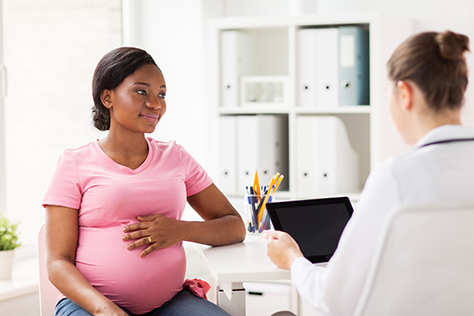New screening tool for pregnancy
Plans are for the new tool to be rolled out to further hospitals in next two years

Latest research reveals there’s a new pregnancy tool that can cut the risk of baby loss for women from black, Asian and ethnic minority backgrounds.
The app works by calculating a woman’s individual risk of problems in the pregnancy.
Researchers reveal the tool uses an algorithm to calculate a woman's personal risk and can detect women who are at high-risk more accurately and prevent complications in pregnancy.
The information provided by the tool can be uploaded by both pregnant women and maternity staff and can also include how they are feeling during antenatal appointments and in general.
Expert researchers from Tommy's National Centre for Maternity Improvement, led by the Royal College of Obstetricians and Gynaecologists and the Royal College of Midwives, carried out the study at St George’s Hospital, London, using the new screening tool.
The study focused on 20,000 pregnant women and experts have said the findings should be able to address health inequalities.
Using the tool for these pregnant women revealed that baby death rates in ethnic groups were down by three times than without the use of the tool.
The study showed that there were nearly eight baby deaths per 1,000 births among mothers from ethnic minority backgrounds. The number for white mothers was 2.63 deaths per 1,000 births using the current checklist for risk assessment.
However, using the new algorithm tool, the results showed there was no difference in baby death rates between white and non-white ethnic groups. This was due to three out of four deaths linked to placenta problems being avoided.
St George’s Hospital is already trialling the screening tool and it is set to be used in three further maternity units in England with a view to a further 20 units using the tool within two years.
The research was led by Professor Basky Thilaganathan who expressed the new screening may “almost eliminate a large source of the healthcare inequality facing black, Asian and minority ethnic pregnant women".
He said: “We can personalise care for you and reduce the chances of having a small baby, pre-eclampsia and losing your baby.”
Dr Edward Morris, president of the Royal College of Obstetricians and Gynaecologists, said: "The digital tool provides a practical way to support women with personalised care during pregnancy and make informed decisions about birth.
"What's clear is the current way of risk assessing women isn't providing the safest approach, and it's vital both clinicians and health policymakers work to update it."
Gill Walton, chief executive of the Royal College of Midwives, said: "All of this great work and effort must continue to be supported with the right levels of funding and resources to enable it to be implemented effectively."